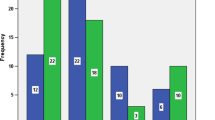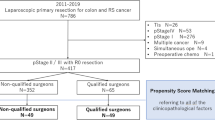Abstract
Background
The learning curve for laparoscopic colectomy (LC) is considered long and difficult. The presence of a preceptor may shorten the learning curve of LC and ensure adequate oncologic and short-term results. City of Hope implemented a full-time LC preceptorship between September 2004 and March 2006 with one experienced surgeon assisting other surgeons. We review our outcomes with laparoscopic colon resection for colon adenocarcinoma after implementation of this preceptorship.
Methods
All cases of laparoscopic colon resection for adenocarcinoma performed from September 2004 to April 2009 were retrospectively reviewed. We compared the patients in two groups: group 1 had surgery performed during the preceptorship period from September 2004 to March 2006 (n = 39) and group 2 had procedures done between April 2006 and April 2009 (n = 74). Clinical characteristics evaluated included sex, age, body mass index (BMI), ASA level, and history of previous abdominal surgery. Postoperative variables evaluated included type of operation, conversion to open surgery, estimated blood loss (EBL), operation time, stage, number of harvested lymph nodes, time to liquid diet, postoperative stay, complications, and 30-day mortality rate. Kaplan–Meier survival curves were constructed based on disease-free survival (DFS) and overall survival (OS).
Results
One hundred thirteen patients underwent LC for adenocarcinoma during the study period. Mean age and BMI were similar between the groups. There was also no significant difference in conversion rates (10.3% vs. 13.5%, p = 0.77) or total complications (25.6% vs. 41.9%, p = 0.088) between groups 1 and 2, respectively. There was a significantly greater number of lymph nodes removed in the post-preceptor period (20.3 vs. 15.8, p = 0.007). The 3-year DFS rate was 96.5%, with a mean follow-up of 22.8 months, and the 3-year OS rate was 88.9%, with mean follow-up of 22.1 months, for the entire cohort.
Conclusion
Implementation of a program with a full-time preceptorship can help institutions overcome the challenges of laparoscopic colectomy and achieve acceptable postoperative and oncologic outcomes.



Similar content being viewed by others
References
Jacobs M, Verdeja JC, Goldstein HS (1991) Minimally invasive colon resection (laparoscopic colectomy). Surg Laparosc Endosc 1:144–150
Law WL, Lee YM, Choi HK, Seto CL, Ho JW (2007) Impact of laparoscopic resection for colorectal cancer on operative outcomes and survival. Ann Surg 245:1–7
Clinical Outcomes of Surgical Therapy Study Group (2004) A comparison of laparoscopically assisted and open colectomy for colon cancer. N Engl J Med 350:2050–2059
Braga M, Frasson M, Vignali A, Zuliani W, Civelli V, Di Carlo V (2005) Laparoscopic vs. open colectomy in cancer patients: long-term complications, quality of life, and survival. Dis Colon Rectum 48:2217–2223
Jayne DG, Guillou PJ, Thorpe H, Quirke P, Copeland J, Smith AM, Heath RM, Brown JM (2007) Randomized trial of laparoscopic-assisted resection of colorectal carcinoma: 3-year results of the UK MRC CLASICC Trial Group. J Clin Oncol 25:3061–3068
Lacy AM, Garcia-Valdecasas JC, Delgado S, Castells A, Taura P, Pique JM, Visa J (2002) Laparoscopy-assisted colectomy versus open colectomy for treatment of non-metastatic colon cancer: a randomised trial. Lancet 359:2224–2229
Veldkamp R, Kuhry E, Hop WC, Jeekel J, Kazemier G, Bonjer HJ, Haglind E, Pahlman L, Cuesta MA, Msika S, Morino M, Lacy AM (2005) Laparoscopic surgery versus open surgery for colon cancer: short-term outcomes of a randomised trial. Lancet Oncol 6:477–484
Weeks JC, Nelson H, Gelber S, Sargent D, Schroeder G (2002) Short-term quality-of-life outcomes following laparoscopic-assisted colectomy vs open colectomy for colon cancer: a randomized trial. JAMA 287:321–328
Bouchard A, Martel G, Sabri E, Schlachta CM, Poulin EC, Mamazza J, Boushey RP (2009) Does experience with laparoscopic colorectal surgery influence intraoperative outcomes? Surg Endosc 23:862–868
Dincler S, Koller MT, Steurer J, Bachmann LM, Christen D, Buchmann P (2003) Multidimensional analysis of learning curves in laparoscopic sigmoid resection: eight-year results. Dis Colon Rectum 46:1371–1378 discussion 1378-1379
Schlachta CM, Mamazza J, Seshadri PA, Cadeddu M, Poulin EC (2000) Determinants of outcomes in laparoscopic colorectal surgery: a multiple regression analysis of 416 resections. Surg Endosc 14:258–263
Black M, Gould JC (2006) Measuring laparoscopic operative skill in a video trainer. Surg Endosc 20:1069–1071
Derossis AM, Fried GM, Abrahamowicz M, Sigman HH, Barkun JS, Meakins JL (1998) Development of a model for training and evaluation of laparoscopic skills. Am J Surg 175:482–487
Pigazzi A, Anderson C, Mojica-Manosa P, Smith D, Hernandez K, Paz IB, Ellenhorn JD (2008) Impact of a full-time preceptor on the institutional outcome of laparoscopic colectomy. Surg Endosc 22:635–639
Seymour NE (2005) Integrating simulation into a busy residency program. Minim Invasive Ther Allied Technol 14:280–286
Poulin EC, Gagne JP, Boushey RP (2006) Advanced laparoscopic skills acquisition: the case of laparoscopic colorectal surgery. Surg Clin North Am 86:987–1004
Pappas TN, Jacobs DO (2004) Laparoscopic resection for colon cancer—the end of the beginning? N Engl J Med 350:2091–2092
Li JC, Hon SS, Ng SS, Lee JF, Yiu RY, Leung KL (2009) The learning curve for laparoscopic colectomy: experience of a surgical fellow in an university colorectal unit. Surg Endosc 23:1603–1608
Tekkis PP, Senagore AJ, Delaney CP, Fazio VW (2005) Evaluation of the learning curve in laparoscopic colorectal surgery: comparison of right-sided and left-sided resections. Ann Surg 242:83–91
Beck DE (1994) Colorectal operative experience. Results of a survey. Dis Colon Rectum 37:905–908
Ritchie WP Jr, Rhodes RS, Biester TW (1999) Work loads and practice patterns of general surgeons in the United States, 1995–1997: a report from the American Board of Surgery. Ann Surg 230:533–542 discussion 542-533
Barleben A, Gandhi D, Nguyen XM, Che F, Nguyen NT, Mills S, Stamos MJ (2009) Is laparoscopic colon surgery appropriate in patients who have had previous abdominal surgery? Am Surg 75:1015–1019
Fielding LP, Arsenault PA, Chapuis PH, Dent O, Gathright B, Hardcastle JD, Hermanek P, Jass JR, Newland RC (1991) Clinicopathological staging for colorectal cancer: an International Documentation System (IDS) and an International Comprehensive Anatomical Terminology (ICAT). J Gastroenterol Hepatol 6:325–344
Disclosures
Carissa Bailey, Michelle Metchikian, Dr. Yasir Akmal, Dr. Jeong-Heum Baek, and Dr. Alessio Pigazzi have no conflicts of interest or financial ties to disclose.
Author information
Authors and Affiliations
Corresponding author
Rights and permissions
About this article
Cite this article
Akmal, Y., Bailey, C., Baek, JH. et al. Oncological outcomes of laparoscopic colon resection for cancer after implementation of a full-time preceptorship. Surg Endosc 25, 2967–2971 (2011). https://doi.org/10.1007/s00464-011-1654-9
Received:
Accepted:
Published:
Issue Date:
DOI: https://doi.org/10.1007/s00464-011-1654-9




